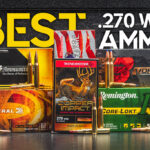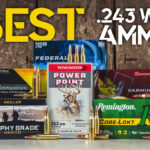
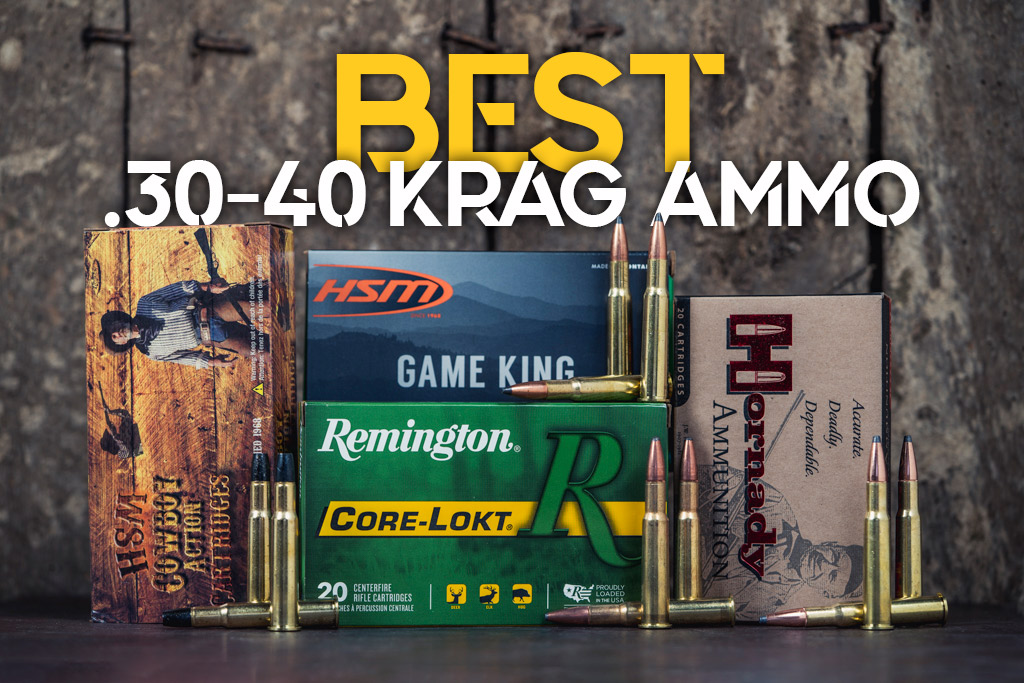
Over the years, hunters and sports shooters have adopted numerous military cartridges. The Springfield .30-06 is probably the most famous smokeless powder ammo that has made the leap from military cartridge to the civilian world. But it wasn’t the first. That distinction belongs to the .30-40 Krag.
For decades, the .30-40 Krag was incredibly popular among segments of the American hunting community. While it is not as prevalent as it once was, the .30-40 Krag still has a passionate cult following.
If you enjoy hunting and would like to broaden your selection of cartridges, the .30-40 Krag might be a good option. In this article, we will take a closer look at the interesting history of the .30-40 Krag and see how it stacks up against a couple of commonly used hunting cartridges.
Best 30-40 Krag Ammo
More than 100 years after its introduction, the .30-40 Krag remains a niche, but useful centerfire cartridge. Pair it with a model 1889 Krag rifle, and you’ve got a classic combination. That said, there are a few solid options out there that have found their way into our list of go-to cartridges. Here are our top picks for the best .30-40 Krag ammo:
HSM 165-Grain RNFP
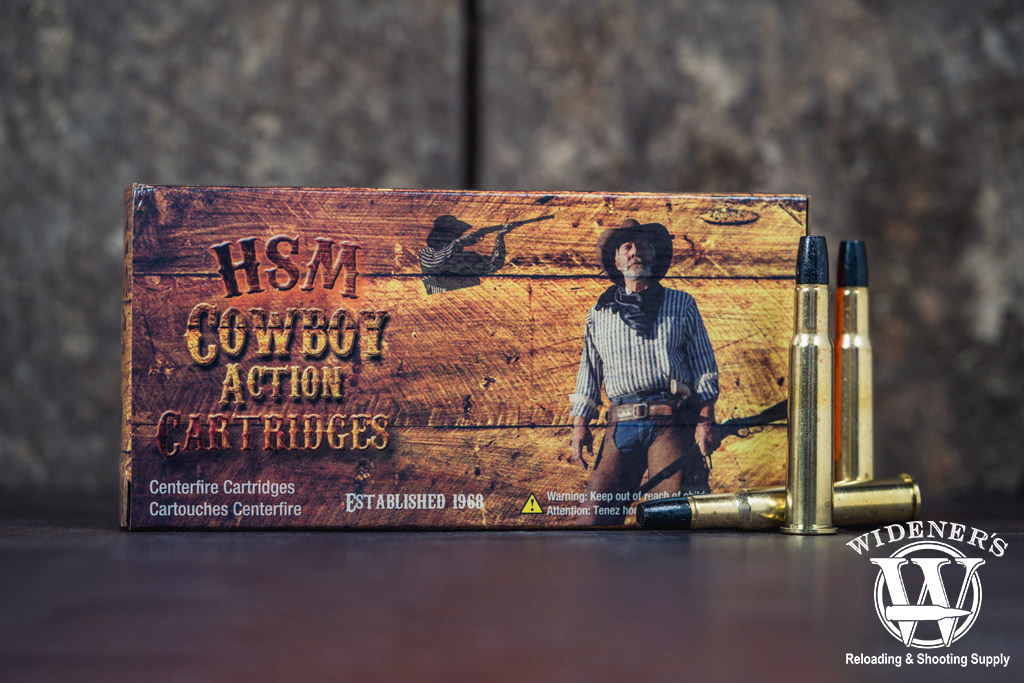
Grab your chaps and spurs! HSM 30-40 Krag cowboy action cartridges will have you ready for your next CAS match.
Yee-Haw, partner! Load up HSM Cowboy Action cartridges for your next CAS competition, These low-recoil rounds make it easy to stay on target, and won’t wear your shoulder out after a long day of shooting. They run great in lever-action rifles, and make reloads on the range a breeze. The round-nose flat-point bullets are formed of hardened lead, so they won’t deform if you drop them from standing height.
Some might consider these rounds slow-pokes, but they do their intended job as advertised. You’ll be looking at a muzzle velocity of 2,130 FPS, producing 1,920 foot-pounds of muzzle energy.
| Caliber | Bullet Type | Bullet Weight | Velocity (Muzzle) | Energy (Muzzle) | 100 Yards (Velocity/Energy) | 200 Yards (Velocity/Energy) | 300 Yards (Velocity/Energy) |
|---|---|---|---|---|---|---|---|
| .30-40 Krag | RNFP | 165gr | 2,130 FPS | 1,920 FT LBS | 1,940 FPS/1,379 FT LBS | 1,670 FPS/1,022 FT LBS | 1,430 FPS/749 FT LBS |
HSM Sierra Game King 165-Grain SP
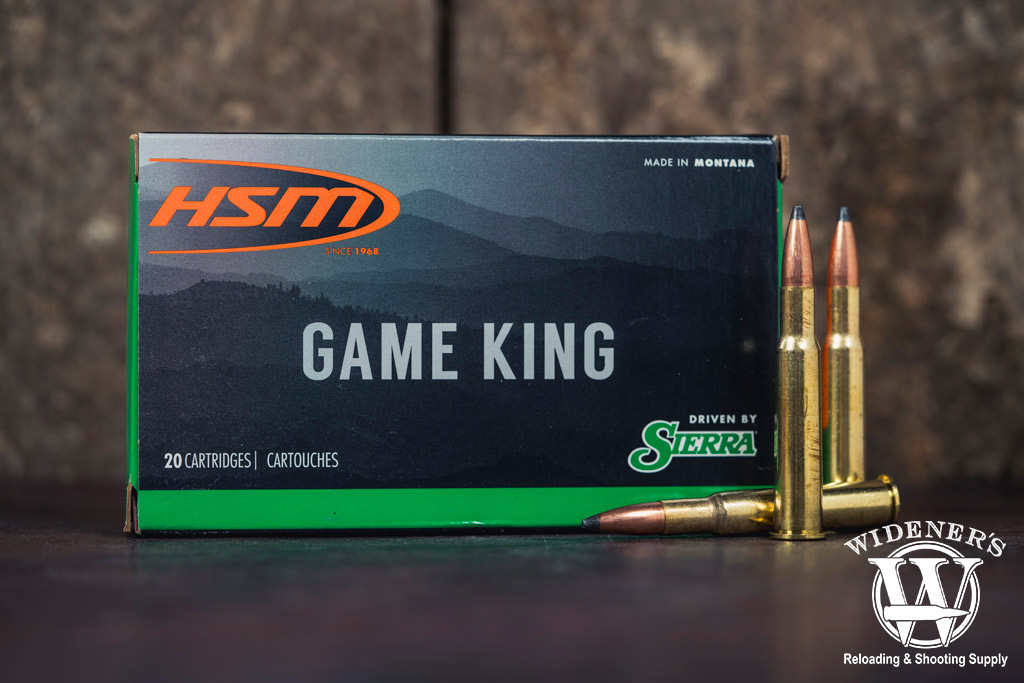
HSM ammo loaded with time-honored Sierra GameKing ammo breathes new life into the .30-40 Krag cartridge.
Handloaded accuracy, and performance you can rely on, HSM ammo brings the heat. Sierra “Game King” bullets have earned superlative accolades for years. You’ll find them loaded in high-performance ammunition across the industry. These cartridges are no exception.
The HSM Sierra Game King 165-Grain SP leaves the muzzle at 2,452 feet per second and maintains a velocity above 1,800 FPS for 300 yards. The highly-capable cartridge produces 2,303 foot-pounds of muzzle energy.
| Caliber | Bullet Type | Bullet Weight | Velocity (Muzzle) | Energy (Muzzle) | 100 Yards (Velocity/Energy) | 200 Yards (Velocity/Energy) | 300 Yards (Velocity/Energy) |
|---|---|---|---|---|---|---|---|
| .30-40 Krag | SP | 165gr | 2,452 FPS | 2,303 FT LBS | 2,262 FPS/1,874 FT LBS | 2,032 FPS/1,513 FT LBS | 1,837 FPS/1,236 FT LBS |
Hornady 180-Grain SP Custom
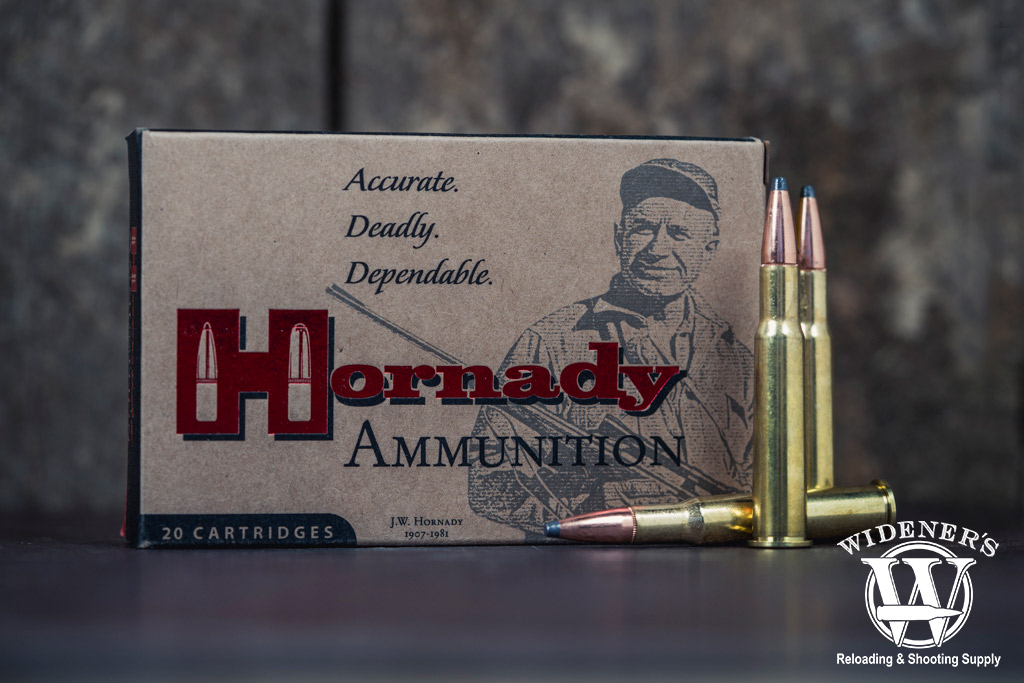
Proven accuracy with deadly effect. Put meat on the table with Hornady Custom ammo.
Hornady’s Custom ammo loads aren’t really a secret anymore. Once upon a time, you had to jump through customer service hoops to get them. Hornady Custom ammunition offers the optimum blend of ballistic efficiency and flatter shooting projectiles for less drag.
The 180-Grain SP Custom has a listed muzzle velocity of 2,430 fps and a muzzle energy of 2,360 ft/lbs. At 300 yards, this Hornady projectile still travels in excess of 1,800 fps. In short, it’s capable of putting meat on the table with plenty of power to down even the biggest deer.
| Caliber | Bullet Type | Bullet Weight | Velocity (Muzzle) | Energy (Muzzle) | 100 Yards (Velocity/Energy) | 200 Yards (Velocity/Energy) | 300 Yards (Velocity/Energy) |
|---|---|---|---|---|---|---|---|
| .30-40 Krag | Poly | 180gr | 2,430 FPS | 2,360 FT LBS | 2,234 FPS/1,994 FT LBS | 2,047 FPS/1,647 FT LBS | 1,869 FPS/1,397 FT LBS |
Remington Core-Lokt 180-Grain JSP
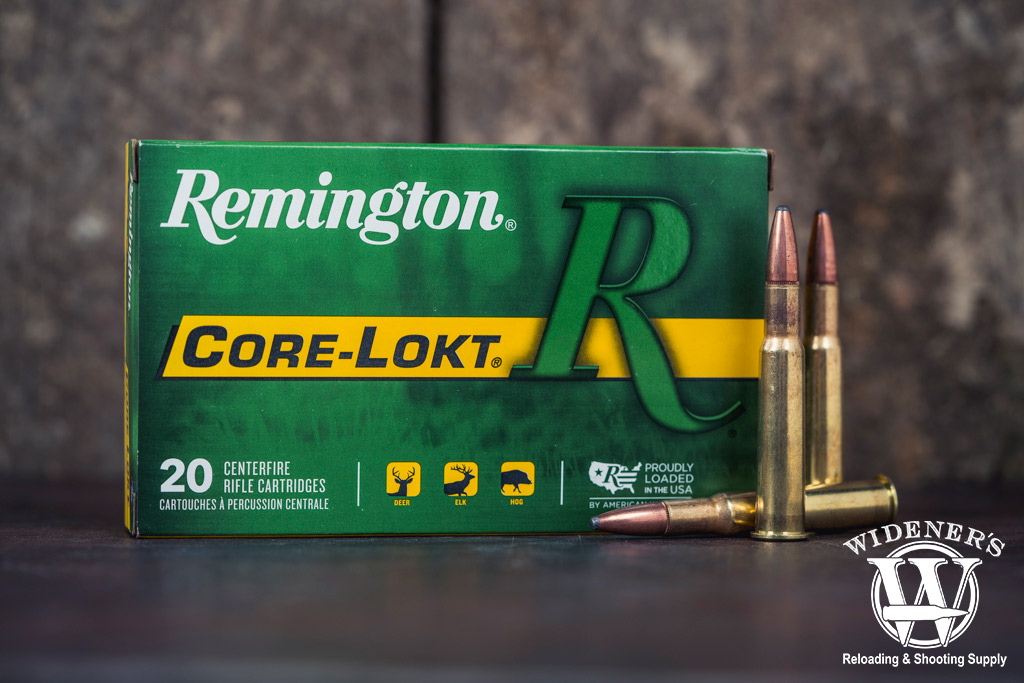
For over 75 years, Remington Core-Lokt’s time-proven performance has made it the hunter’s choice.
Bring home the big game. Remington’s Pointed Soft-Point (JSP) bullet was born ready to hunt. Remington Core-Lokt 180-Grain PSP has been getting the job done since before many of you were born. What makes it legendary? Expansion, penetration, and reliability.
A muzzle energy of 2,360 foot-pounds and a muzzle velocity of 2,430 FPS. What can you expect? A reliable cartridge that works exactly as advertised.
| Caliber | Bullet Type | Bullet Weight | Velocity (Muzzle) | Energy (Muzzle) | 100 Yards (Velocity/Energy) | 200 Yards (Velocity/Energy) | 300 Yards (Velocity/Energy) |
|---|---|---|---|---|---|---|---|
| .30-40 Krag | JSP | 180gr | 2,430 FPS | 2,360 FT LBS | 2,213 FPS/1,957 FT LBS | 2,006 FPS/1,608 FT LBS | 1,815 FPS/1,317 FT LBS |
Cartridge Specs & Overview
The .30-40 Krag is known for its ability to bring down wild game. With bullet weights ranging from 100 to 220 grains, it can achieve velocities up to about 2,800 feet per second (fps) with lighter bullets and maintain effective velocities of 2,000 fps with heavier bullets. This versatility allows shooters to tailor their ammunition choice to the specific game or target.
| Cartridge Specs | .30-40 Krag |
|---|---|
| Parent Casing | N/A |
| Bullet Diameter | .308″ |
| Neck Diameter | .338″ |
| Base Diameter | .457″ |
| Case Length | 2.314″ |
| Overall Length | 3.089″ |
| Grain Weight | 100gr-220gr |
| Max Pressure (CIP) | 47,137 PSI |
Ballistics: 30-40 Krag
Originally, Krag cartridges featured a 220-grain bullet. It had a muzzle velocity of 2,000 FPS and muzzle energy of 1,954 ft-lbs. Not too shabby.
Modern .30-40 Krag loads fire a 180-grain projectile. The cartridge boasts 2,430 FPS of muzzle velocity and 2,360 ft-lbs of muzzle energy thanks to the lighter projectile. This makes it an excellent round for downing elk, deer, and other medium-sized game at close to moderate distances.
But how does it stack up against more well-known cartridges like the .30-06 or .30-30? Read on to find out.
30-40 Krag VS 30-30
The .30-40 Krag and .30-30 Winchester are close cousins regarding the bullet caliber and the amount of powder used to propel their projectiles. They are also quite similar regarding their muzzle velocity.
Most .30-30 cartridges will provide somewhere in the neighborhood of 2,200-2,500 FPS of muzzle velocity. Of course, this fluctuates based on barrel length and cartridge specifications. But, unsurprisingly, they generate a similar amount of recoil.
However, the .30-40 Krag projectile is heavier, meaning it generates more muzzle energy. You could opt for a 170-grain .30-30 projectile instead of the traditional 150-grain option. But even when you upgrade to the larger .30-30 bullet, the Krag edges it out in terms of energy.
30-40 Krag VS 30-06
The .30-06 Springfield features a longer case. This attribute allows it to hold more power. Naturally, more powder leads to a faster bullet. Since the .30-06’s projectile travels faster, it is more resistant to wind drift and has a flatter trajectory.
While the ballistic performance of each round will vary depending on the load you are using, the .30-06 generally travels 200-300 FPS faster than the Krag. The straighter flight path and increased speed enable the .30-06 to deliver more energy to the target.
The .30-40 Krag does have one thing going for it, though, recoil. The Krag generates much less recoil than the .30-06. This makes it appealing to a broader range of shooters.
A Brief History: 30-40 Krag Ammo
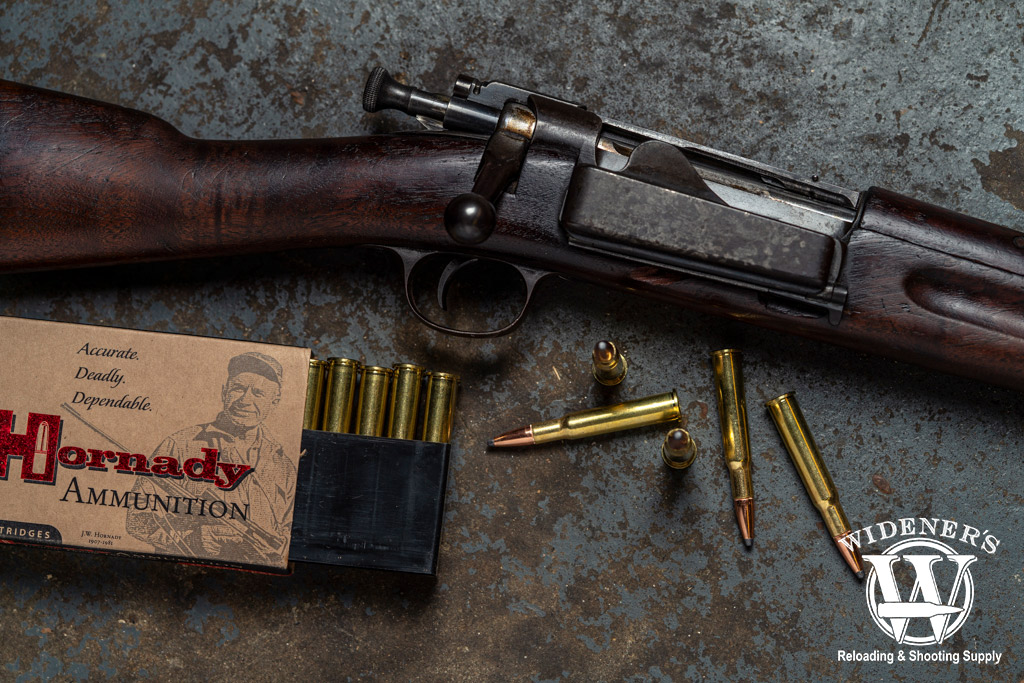
The jump to a smokeless powder cartridge gave the 30-40 Krag a ballistic advantage over its competitors.
The Trapdoor Springfield and .45-70 Government cartridge packed a tremendous punch. But, in the late 1800s, the U.S. Army decided it was time to transition away from single-shot rifles and black powder cartridges.
Ultimately, military leaders selected the Springfield Model 1892, a bolt-action rifle chambered in .30 U.S. Government, a brand new cartridge. Over the years, this cartridge was assigned many names, including .30 Government, .30 Army, .30 U.S.A., and of course, .30-40 Krag.
The .30-40 Krag had a relatively short run as the U.S. Army’s official rifle cartridge. That’s probably why you may have never even heard of the .30-40 Krag until relatively recently. But, it was the first Army cartridge specifically designed to use smokeless powder. Its predecessors adopted smokeless powder after they were designed.
Even though the .30-40 Krag used smokeless powder, designers adhered to the traditional naming convention of the time. The first number, “.30,” represents the cartridge caliber, and the second number, “40,” refers to the standard powder load. The cartridge has a .30 caliber bullet propelled by 40 grains of powder.
“Krag” was added to the cartridge’s name to pay homage to Captain Ole Herman Johannes Krag. This Norwegian military officer worked with Erik Jorgensen to design the Krag-Jorgensen rifle. The Springfield Model 1892 was a slightly modified variant of the Krag-Jorgensen repeater.
Why It Remains A Popular Hunting Cartridge
While the .30-40 Krag has a few limitations, it packs a wallop and can take down deer, elk, and other medium- to large-sized game. The Krag also has a relatively flat trajectory and maintains its velocity well to about 300 yards.
But some hunters have other motivations for using .30-40 Krag ammo: nostalgia. There is just something enjoyable about using an old-school round to down your favorite game. So whether they are paying respects to a parent or grandparent or simply like doing things a little differently, there are plenty of great reasons to hunt with the .30-40 Krag cartridge.
Final Take: Best 30-40 Krag Ammo
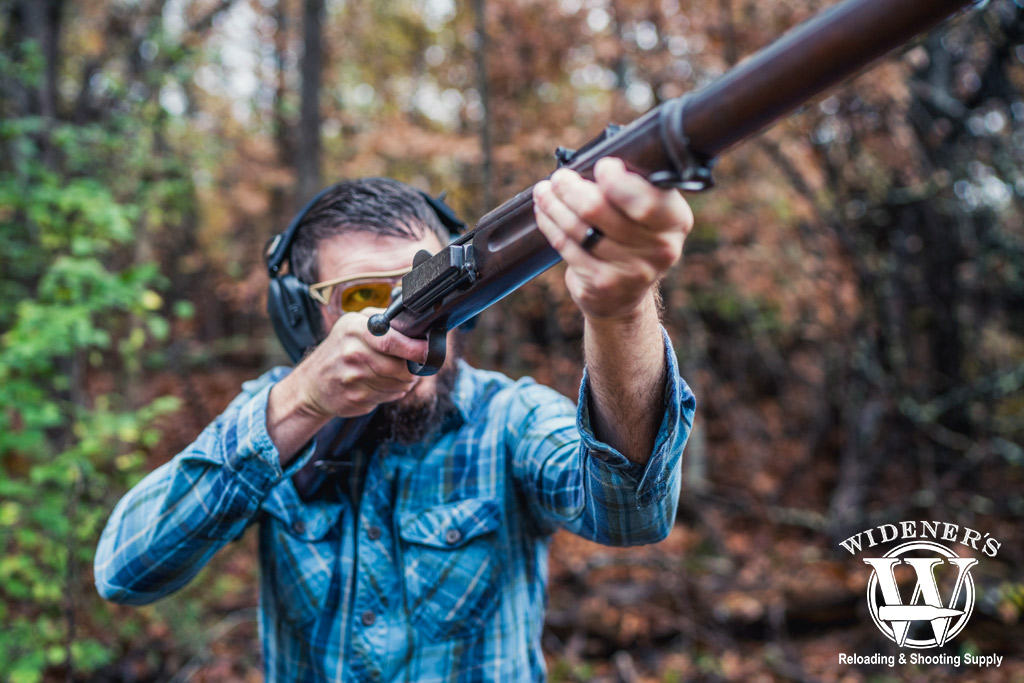
It might be a “one-war” rifle, but the 1889 Krag-Jorgensen has one of the smoothest actions in bolt-action history.
The .30-40 Krag has been around for over 130 years and shows no signs of fading into obscurity anytime soon. So if you are interested in a capable hunting round and don’t mind searching for ammo, the .30-40 Krag can be an excellent addition to your collection of rifles.
Speaking of rifles, you might have a tough time finding one. There are plenty of them on the secondary market. But as far as I can tell, no one is producing any new .30-40 Krag rifles.
Once you get your hands on a Krag rifle, check out our ammo selection and let us help you gear up for hunting season.


